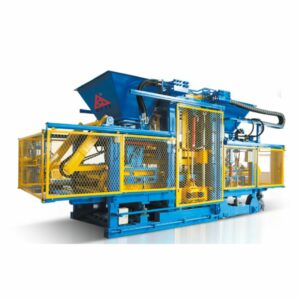Using a brick making machine offers several advantages over traditional brick-making methods. Here are some key benefits:
Increased Efficiency: Brick making machines are designed to automate the brick production process, resulting in significantly higher production rates compared to manual methods. They can produce a large number of bricks in a relatively short amount of time, improving overall efficiency and productivity.
Consistency in Quality: Brick making machines ensure consistent quality in the bricks produced. They have precise controls and mechanisms that help maintain uniformity in size, shape, and strength of the bricks. This consistency is difficult to achieve consistently with manual methods, which may result in variations and inconsistencies in the final product.
Cost Savings: While the initial investment in a brick making machine may be higher, it can lead to long-term cost savings. With increased production rates and reduced labor requirements, the cost per brick can be significantly lower compared to manual methods. Additionally, machine-made bricks often require less mortar during construction due to their precise dimensions, further reducing material costs.
Time Savings: Brick making machines can save a substantial amount of time compared to manual brick-making methods. The automated processes involved, such as mixing, molding, and curing, are faster and more efficient. This allows for quicker completion of projects and faster availability of bricks for construction purposes.
Improved Worker Safety: Manual brick-making methods can be labor-intensive and physically demanding, leading to potential health and safety risks for workers. The use of brick making machines reduces the need for manual labor, minimizing the risk of injuries and work-related health issues.
Flexibility in Design and Shapes: Brick making machines often offer versatility in producing bricks of different shapes, sizes, and designs. They can be adjusted to create customized bricks to meet specific architectural or construction requirements. This flexibility opens up possibilities for creative designs and unique applications in construction projects.
Environmental Considerations: Some brick making machines employ eco-friendly practices. They may use recycled materials, such as crushed construction waste or fly ash, as part of the brick-making process. These machines can contribute to reducing waste and conserving natural resources, making them more environmentally friendly compared to traditional brick-making methods.
It’s important to note that the specific advantages of using a brick making machine can vary depending on factors such as the type of machine, china brick making machine its features, and the specific needs of the brick-making operation. Careful consideration of these factors is necessary when deciding whether to adopt a brick making machine for a particular project or construction operation.
What are the different types of brick making machines available?
There are various types of brick making machines available, each designed for specific purposes and production capacities. Here are some common types:
Manual Brick Making Machine: These machines are operated manually by a person. They are typically used for small-scale brick production and require manual input for tasks such as material feeding, mixing, and brick molding. Manual brick making machines are relatively simple in design and have lower production capacities compared to automated machines.
Semi-Automatic Brick Making Machine: Semi-automatic machines combine manual and automated processes. They require manual input for tasks like material feeding and brick removal, while other processes, such as mixing, molding, and curing, are automated. Semi-automatic machines offer higher production rates compared to manual machines.
Fully Automatic Brick Making Machine: Fully automatic machines are highly automated and require minimal manual intervention. They can perform all tasks, including material feeding, mixing, molding, brick removal, and curing, automatically. These machines offer the highest production capacity and efficiency. They are suitable for large-scale brick production operations.
Hydraulic Brick Making Machine: Hydraulic machines use hydraulic systems to compress the raw materials and form bricks. They provide high pressure during the molding process, resulting in bricks with excellent strength and density. Hydraulic brick making machines are known for their precision and consistency in producing quality bricks.
Fly Ash Brick Making Machine: Fly ash brick making machines are specifically designed to utilize fly ash, a byproduct of coal combustion, as a raw material. These machines mix fly ash with other materials like sand, cement, and water to produce fly ash bricks. They are environmentally friendly and contribute to the utilization of industrial waste.
Concrete Block Making Machine: While not strictly for brick production, concrete block making machines are widely used for producing concrete blocks, which can be used in construction. These machines use a combination of cement, aggregates, and water to form solid or hollow blocks. They come in various sizes and configurations to produce different types of concrete blocks.
Clay Brick Making Machine: Clay brick making machines are designed specifically for clay-based brick production. They can handle the processing of raw clay, including mixing, molding, and drying. Clay brick making machines produce bricks with excellent strength and durability.
It’s important to note that the availability and specific features of brick making machines may vary depending on the manufacturer and region. The choice of the machine depends on factors such as the scale of production, desired brick characteristics, available resources, and budget considerations.
